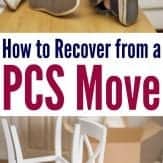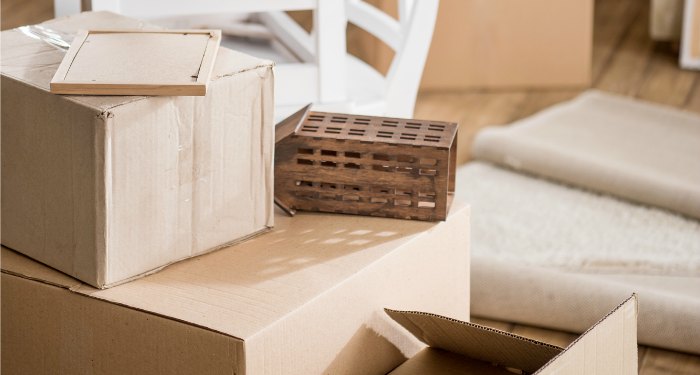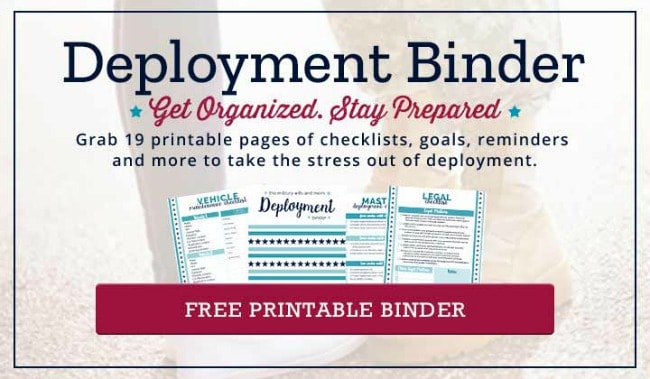The longer we are active duty military, the more quickly and aptly I’m able to self-diagnose and articulate the funk I’m in. What it is this time, is something I have recently described as the Post-PCS Crash, also known as Complete Depletion. There is a process to arriving at this state of being, so I’ll explain.
For the few weeks leading up to the move, you find yourself in “get it done” mode. You’re working at break-neck speed to offload unwanted home items; you’re purging, and organizing. Physically, it is tiring.
You are saying goodbyes to friends and Army family; you are trying to protect your heart; you are making sure the kids are doing okay with the weight of the move. It is summer and you will be darned if you let the move eat up all of the fun, so you try to plan for some adventure and enjoyment to mark the time; but not too much fun because you don’t have the energy for it. Emotionally it is tiring.
Then, you have the “move week” where you are truly functioning on high-surging adrenaline. The packers and movers are in and out of your house; you are feeding them, overseeing their progress, trying to estimate whether or not your belongings will arrive at the next place safely. You clean and empty your way out of your house; wiping away dust, memories and…tears.
You make the physical move, for some this takes hours and for some this takes days. You and your spouse drive both loaded down vehicles to the next state; they are heavy with cleaning supplies, air mattresses, suitcases, duffle bags, Crock-pots, emotions.
You try to reframe the whole thing as an adventure…a road trip of sorts…are we having fun yet?
This post contains affiliate links as part of the Amazon affiliates program, which means if you make a purchase, at no additional cost to you, I will earn a commission. See our full disclosure policy here.
You arrive and you inquire about your next house. Is there one available? How long until we can move in? How long until we receive our household goods?
Mentally, you assess how your things may or may not fit into the house. You will deal with various housing issues like urgent repairs and financial matters— deposits, turning on utilities while you are still paying last bills at your old address, pro-rated rent, long-term temporary housing until your real estate closing.
You store or donate what you don’t need— d***it we just sold our mower and weed eater and they *don’t* mow your back yard on post!
It’s like a drain plug has been pulled from your checking account. You’ve just paid to have your house and carpets cleaned, the grocery budget is a joke that mocks you after weeks of eating out; and now you are buying and replacing what you do need to make your new house functional— rugs, doormats, a new broom, extension cords, a lawn mower, and bedding because you’ll be reconfiguring your kids’ bedroom furniture yet again.
You are in desperate need of a good night of sleep or maybe some alone time, maybe both. You are hotel weary. That continental breakfast was sufficient on day one or two, but by day twelve if you ever see another stale pastry, it will be too soon.
Or maybe you are so tired of sitting in your empty house on nothing but camping chairs. You are like a turtle carrying your home on your back as you trek laundry for a family of five down the hall, across the street, or in and out of your car at the laundromat. You are starting to sorely miss your creature comforts. Literally.
Household goods arrive and you compulsively begin unpacking and arranging your house to make it a home. These are the days where that adrenaline is surging the hardest. You are already worn out from the previous few weeks. And now, it’s go time. Slow down, pace yourself, some may say…but you just want to unpack and settle as quickly as possible.
Yes, the movers bring your things inside the house. Yes, they do most of the heavy lifting. But these few days are truly back-breaking. You are ripping off tape, unwrapping packing paper like mad. You are squatting, lifting, arranging…dishes, books, closets, keepsakes. You’re moving things from room to room, exhausted, sweating, and sore.
Just one more box. Just one more hour. Just one more room. Then you can rest. You think the finish line is in sight, but those big brown boxes with packing tape and stickers loom over you.
Rest? Not anytime soon.
When your kids are a little older, the unpacking can be a family affair, thankfully. Many hands make light work, and the faster things are unpacked and settled, the faster, you hope, everyone can begin meeting neighbors, making connections, and enjoying the new place. There is a temporary, albeit false, sense of ahhhhhhhhh— the house is unpacked and looks a little like home, it’s starting to feel like we live here.
There are a few days or weeks when you’re floating on the adrenaline high of the move. This is the period where I’m wearing my rose-colored glasses and my Pollyanna-cheerful-we-are-gonna-love-it-here-and-golly-gee-this-is-super attitude carries me along.
You check out some cool attractions in your area—eat at the local spots, enjoy the amenities on post, visit a church, ask strangers where they have their hair done, orient yourself to the nearest Target, revel in the glory of having a Trader Joes (if only temporarily), and begin having conversations with your neighbors.
These are the activities that follow after your boxes are unpacked. These are the activities that help you acclimate to a new place and new people. These are the activities that temporarily trick you into thinking you have arrived and you are settled.
As much as you fight to maintain a positive attitude and optimistic outlook about the new place and the fresh opportunities…what goes up must come down. The universal law of gravity is also the universal law of a PCS. It’s the let-down effect or what I’m calling the PCS Crash. A prolonged period of stress is finally coming to a close or at least tapering off and your body is telling you it is time to rest and chill-the-heck-out.
Another way the sudden decrease in pressure can set you up to crash and burn: “Emotional stress and physical stress kick up the same inflammatory response, which opens the door for illness or the let-down effect…” After either type of stress dies down, there’s “a down-regulation of the immune system, a suppression of the immune response, [as a reaction] to the easing of stress.” In addition, the surge-and-fall of stress hormones could knock down dopamine levels in the brain, which can trigger overeating and substance abuse as people (unconsciously) try to raise their dopamine levels so they can feel reward and pleasure again…” (U.S. News and World Report)
Over the past few days I’ve begun feeling the crash. I have been irritable, snippy, more anxious than usual, and flat worn-out. I actually succumbed to the exhaustion two days ago and took a nap at 10 am; I’ll probably do it again today as I woke up at 5:00 am with my mind racing.
A few years ago, I would have tried to outrun the tired and choke it out with more busyness and activity. And as the blurb from the article above suggests, some use food or drugs to feel reward and pleasure again. I’m a busy-junkie, but I’ve learned that’s not the way to solve or remedy the Post-PCS Crash.
You remedy it with as much rest as possible. You go to bed early, you nap often, and you relax. You don’t put pressure on yourself or your family to do anything other than replenish your physical, mental, spiritual, and emotional reserves.
You stay still. You breathe deeply. You pray and meditate. You exercise. You take long walks. You look out around you and up to the sky. You eat healthful foods. You read or watch television or journal. Busyness does not eradicate exhaustion…rest does.
Those of us who are military spouses know that this rest-chasing is difficult to master. We want to maximize our time on station; see the sights, meet the people, do the things. And in time, we will, but we cannot pour from an empty or broken cup. It’s easy to allow a PCS to take center stage of our lives when it comes.
There is so much to do and most of it feels urgent and necessary. There comes a point though that you have to let the urgent and necessary die down and fizzle out. There comes a point when you have to set aside the hustle and embrace chill mode. I don’t like the image of crashing and burning. I prefer the image of my body (and mind) telling me it’s time to slow down, stop if necessary, wait, rest, and to enjoy an interlude of tranquility.
Won’t you join me?
This article was originally published on Elizabeth Claire Wood. Connect with Clair via her blog or check out her book Mission Ready Marriage
.
Want more on military life?
- 10 Things Military Spouses Won’t Tell You About Deployment
- 7 Boot Camp Graduation Gifts That Will Make Your Service Member Smile
- The Real Reason Why Being a Military Wife is So Hard
- 10 Must-Have PCS Moving Books for Military Kids










The only thing I could possibly add to this excellent piece is mentioning the working military spouse who has to leave their own friends and colleagues AND find a new job with all the stresses that creates at the new location. Not all military wives are able to lose the income her job brings to the family budget. Some have professions they don’t want to abandon every three years or so. All of that adds to the stress, too.
Yes! I am a nurse practitioner, or so I thought. But, I’ve only had 6 weeks of a go at it because we will PCS 3 times in 3 years. Throw having a baby in there and I will never get back into my profession.
I agree..only thing missing was the career perspective and on the flip side of having to find a new job every few years, I have a full time corporate job where I work from home so it thankfully travels with me, BUT it means having to work full time during all the above mentioned stress…and the military doesn’t care when my busy time at work is and certainly doesn’t work a PCS around it!
Try being a single parent (mom) of two as a career Marine. There is no down time. Certain things get shut down to cope and be strong at the new command and job, and for your kids. There’s no meeting the neighbors, scheduling fun time to acclimate, it’s all survival mode.
And if your husband is a Commander, there is no down time either. You jump in with both feet. It takes its toll.
Don’t forget having to ship a vehicle is moving overseas. Having no transportation for close to a month with a toddler is NOT fun at all. PCS in 3months and I’m just glad I have friends at the next station otherwise I would be more stressed out than I already am. I feel bad for my husband who is the military spouse because I haven’t been able to be around during our pack outs with the movers and hope to be around this time.
Throw in a high school graduation at OCONUS post right before the movers come and you have guests from the continental US… the stuff of nightmares.
I recently met the man of my dreams online. We have been talking online for the past 3 months. He is in the marine corps and currently deployed in Syria. We have applied for him to take a vacation leave. I have never met this man but we are deeply in love. In order for him to leave i have to pay for fee for his leave approval. I just want to confirm if anyone knows of this fee actually having to be paid. I dont want to be taken advantage of and hoping this is all true. I willing to pay it if its legit. I would walk a million miles for this man. So if anyone can reassure me it would be greatly appreciated.
Hands down, NOT legit. This is a scam, and not even a creative one. I’m so sorry for your broken heart, but this man is no Marine. Run, fast.
We created a nationwide moving company thats owned and operated by Military Veterans. A perfect match jobs for Veterans and active duty get Movers who take pride in their work. Not to mention the camraderie. Always looking for Veterans to work and people to move.
https://veteransmovinghelp.com
Thank you for this wise article. Excellent framework to see a PCS through and importance of activating skills to monitor the inevitable stress milestones during a PCS! I’m doing my first PCS and it is overseas as a spouse. Our experience ticks all of the boxes in this article with the added dimensions of “COVID-19 layer,” language, and Afghanistan evacuation. It’s adding more stress onto my spouse’s workload.
We work to lead us both towards a functional “down regulation” now the house is set up. It takes effort and fortitude to stay in the positive zone and systematic. Stay the course and it will improve. 🙂 kindness to others and self is an effective way to counter “stress fog.”